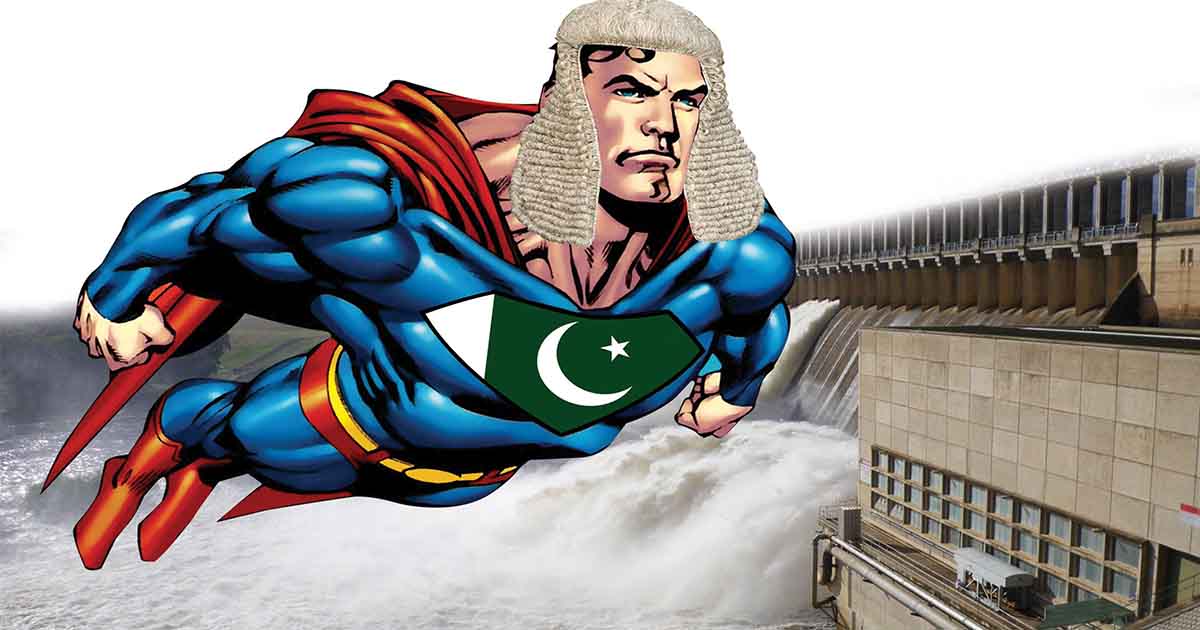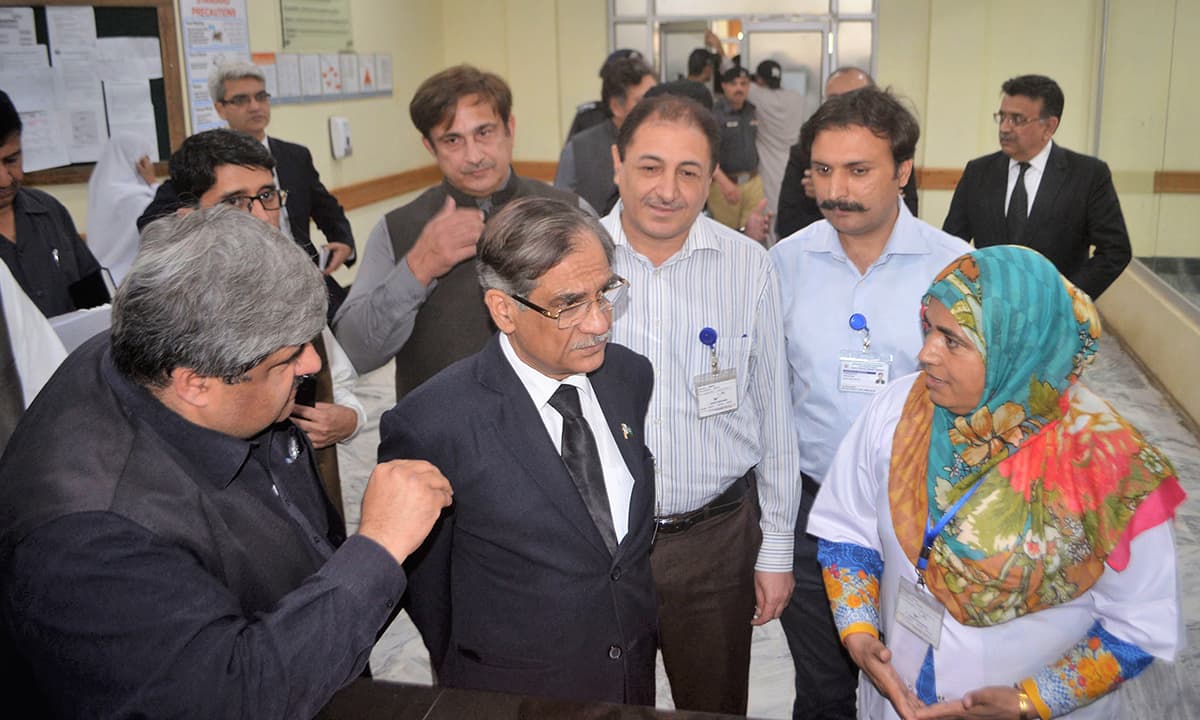
Over the years the extrajudicial utterance of Charles Evans Hughes, Chief Justice of America that “The Constitution is what the Judges say it is…..” has been debated amongst jurists and sometimes wrongly used by some to advocate that judges do and should make law.
However, this reliance is totally misplaced. What Hughes really meant was that while the Constitution and laws are made by Parliament, it is for the courts to interpret what a particular provision means in a given situation. What he certainly never intended to say was that judges are free to adopt whatever reading of the constitution or the law pleases them, and worst still to declare a law to “be” when Parliament has not enacted it as the law.
The decisions of the apex court are final with no further appeal to a higher forum, and as provided in Pakistan’s Constitution, binding on all other institutions, including parliament and the executive.
During the tenure of Chief Justice Mian Saqib Nisar, there was again a flurry of activity within the Supreme Court and according to reports hundreds of suo motu cases were initiated.
If the courts are given the power to make laws or pass “executive judgments”, then this would not only be against the democratic norms but would also violate the established principle of separation of powers in which each organ of the state (parliament, executive and judiciary) are assigned their respective roles.
In a civilized democratic country, the power to make law is the prerogative of the people, and under Pakistan’s Constitution, is with the parliament. The judges who are not elected but appointed, must act under and in accordance with law and not above it, and cannot usurp the power of the Parliament or create laws in vacuum.
Read more: The dharna Judgment – Our new judicial discourse?
There is no doubt that if the legal system is to survive, the courts of the country must be independent, powerful and fair, and also be able to act as a check and balance on any abuse of power by other state institution. The forefathers of Pakistan’s Constitution were cognizant of this and realized that if the courts, who had neither the power of the sword or the purse, were not given sufficient authority and made free, they would be unable to protect the fundamental rights of the people.
The Constitution hence gave the power of judicial review to the High Courts and Supreme Court by virtue of which any law, which is against the Constitution, and any act of the executive which is contrary to the law, can be declared to be void and illegal. Pakistan’s Constitution also gave another unique power to the Supreme Court, which is now well known as the “Suo Motu jurisdiction”, by virtue of which the Supreme Court could, on its own, take up the matter for enforcement of fundamental rights.
In a civilized democratic country, the power to make law is the prerogative of the people, and under Pakistan’s Constitution, is with the parliament.
The pre-condition which was laid out for the exercise of this jurisdiction was that the matter must also be one of public importance. The Constitution, however, did not envisage, nor could the forefathers have ever dreamed that the suo motu power of the Supreme Court or the power of judicial review of the courts would ever be used to usurp the rights of the Parliament or the executive as shrined in the concept of separation of powers.
Although, the Constitution guarantees the tenure of a judge of the superior court, the journey of our superior courts towards true independence has been one of highs and lows and took its time. Today we are proud to acknowledge that Pakistani courts are as independent as any other court in the world. However, independence does not mean that the courts are independent of the law.

For many years the expectations of the people that the Supreme Court while exercising the power of suo motu jurisdiction would do so with judicial restraint, proved to be correct and a review of the decisions in earlier decades show that the courts did not interfere in the matters of governance or policy. Then two things happened.
First, the then Chief Justice of Pakistan, Iftikhar Muhammad Chaudhary, was removed by General Musharraf and then eventually restored after a massive agitation known as the “Movement of Black Coats”. This initially had a positive impact, since armed with people’s power, the Supreme Court was able to strengthen the concept of judicial review and more importantly established, in the minds of the public, that Pakistan’s judiciary is independent.
But then a second event happened. This was the advent of a “free and independent media” which took on the role of the fourth pillar of the state. At the same time, the Governments and Parliaments were unable to cope with the expectations of the public in matters of governance. Instances of mismanagement by political players began to be highlighted by the media.
In a civilized democratic country, the power to make law is the prerogative of the people, and under Pakistan’s Constitution, is with the parliament.
When a few public or social-oriented issues which were not addressed by the executive were taken up and successfully decided by the courts, the expectations of the people that the judiciary is their saviour and the solution to all ills in the society started rising. The courts started getting more and more publicity.
Popular decisions and even court proceedings, which are closely monitored by the press, brought fame and then this eventually resulted in turning, in some cases, the judicial activism into judicial adventurism. I may add that this phenomenon was happening in other parts of the world as well.
Judicial activism is sometimes necessary because in many instances a dynamic approach which is restrained within the confines of the Constitution is needed to protect the rigours of arbitrary government actions. To this extent, there are many decisions by the Supreme Court which advanced the enforcement of fundamental rights and were within the mandate of judicial review.
Read more: The Faizabad dharna judgment
The decision, for example, for upholding the right to education and restraining the government to close schools in remote areas, as well as the judgment recognizing that an updated and transparent voters’ list is part of the rights of people in a democracy or orders freeing brick kiln workers or stopping environmental pollution are all excellent examples of due exercise of suo motu powers.
The Supreme Court, through innovation, has rightly diluted the hurdles in the way of approaching the court for justice by expanding the concept of “aggrieved person” and in Sheila Zia’s case the court gave meaning and substance to the fundamental right to life equating it with the right to enjoy and live with amenities.
However, serious reservations can be raised with judicial activism overtime turning into judicial adventurism. This happens when a judge takes upon himself the duty to correct social evils. In the zeal to reform, courts have been known to put the concept of judicial restraint aside and make decisions falling within the realm of governance of the country, which no court should be allowed to.
The Supreme Court was able to strengthen the concept of judicial review and more importantly established, in the minds of the public, that Pakistan’s judiciary is independent.
Some of the judgments made by the Supreme Court at that time can be considered to reflect this abandonment of judicial restraint. It was at this time we saw the Supreme Court passing orders fixing the prices of sugar, removing public officials, cancelling government contracts, changing and laying down government policies and even appointing and changing investigators.
These kinds of judgments which were hailed in the media and caught the imagination of the people also resulted in over-confidence in the judiciary at the expense of other institutions of the state, thus flooding the courts with some illegitimate and unfair prayers. At the same time, the normal litigants were neglected and the backlog of pending cases rose drastically.
Read more: “I have no political agenda,” says CJP Nisar
The suo motu jurisdiction, if not used properly, has the potential to come into conflict with the concept of substantive due process and fundamental right to fair trial which is part of Pakistan’s Constitution through Article 10A. Under Article 10A, an individual is entitled to have a dispute resolved or guilt determined in a court of the first instance where one is entitled to produce evidence, cross-examine witnesses, present one’s defense and file an appeal to higher courts.
If the apex court through inquisitorial proceedings decides the case itself and determines the civil liability or criminal culpability of a person, I ask you, “Would this be a fair trial”? There has been no evidence, no cross-examination, no appeal because suo motu proceedings appear to be inquisitorial.
This is clearly against all principles of due process which is enshrined in not only our Constitution but also in Article 14 of the International Covenant on Civil and Political Rights, Article 6 of European Convention on Human Rights, Article 7 of the African Charter on Human and Peoples’ Rights and Article 8 of the American Convention on Human Rights.
it has been challenged on the grounds that this is a matter which Supreme Court was not capable of deciding since fixing of fees could only be done through law made by Parliament.
Post the retirement of Chief Justice Iftikhar Muhammad Chaudhary, hence the greatest challenge to the Supreme Court was how to balance the suo motu jurisdiction and structure any excess of power. It was recognized by all that the correction in the future have to be made by no other institution except the courts themselves because it is rightly said that “Guardians have to guard themselves.”
The pendulum was sought to be corrected by the Chief Justices of Pakistan who followed. During the tenure of Chief Justice Mian Saqib Nisar, there was again a flurry of activity within the Supreme Court and according to reports hundreds of suo motu cases were initiated.
Read more: Utility store employee’s Dharna at D-Chowk enters into third day
While many of the cases clearly related to enforcement of fundamental rights and were necessary, but some once again have given rise to great controversy. The Supreme Court of Pakistan for example in December last year directed private schools to reduce their fees by 20%. While this was a popular decision, it has been challenged on the grounds that this is a matter which Supreme Court was not capable of deciding since fixing of fees could only be done through law made by Parliament.
Other examples of apex court apparently overreaching into the territories of other institutions includes the directions to Federal Government to withdraw the taxes on mobile phone use and the ordering of imposition of tax or charge on groundwater extraction. Both these decisions again have been popular but may not fall within the jurisdiction of the Supreme Court.
The suo motu jurisdiction, if not used properly, has the potential to come into conflict with the concept of substantive due process and fundamental right to fair trial which is part of Pakistan’s Constitution through Article 10A.
Taking note of social evils and trying to correct them because the media reports it, and there is hype for it, amounts to pandering to public opinion whereas it is well said that “Public opinion is an unruly horse and should not be ridden by the judiciary.” US Supreme Court in its recent judgment has so rightly pointed out that “Social evils in society must be corrected by the people and their representatives and not by the court.” How to correct social evils, Ibrahim Lincoln has given the formula, “If people turn their backs towards the fire, they shall have to sit on the blisters.”
Read more: Faizabad Dharna Discredits Army
It is time to let the people, their representatives and other institutions take this herculean task and judiciary to walk out of it. If judges in their zeal to change or reform create a law when none exists, then the entire structure of democracy is likely to go haywire and along with it the legal system too can be irreparably damaged.
The suo motu jurisdiction under Article 184(3) is necessary but must be balanced and controlled and the only way to do it is to have a strong parliament and government, robust legal community represented by active bar associations, independent colleague judges and responsible media and above all an educated civil society.

As rightly pointed out by the current Chief Justice of Pakistan, Asif Saeed Khosa, there is a dire need to restructure the powers that lie under suo moto jurisdiction of the Supreme Court. I would hope that the Supreme Court undertakes this exercise on its own and structures the discretion for the exercise of these powers.
One way would be that suo motu proceedings can only be initiated if the senior-most five judges of the Supreme Court decide to do so instead of on the whim and fancy of the Chief Justice or the Human Right Cell.
To make the process fairer, an appeal may also be provided to a larger bench against the decision made in exercise of powers under Article 184(3). I would hope that this balancing act would be carried out by the Supreme Court itself but if not then Parliament is likely to step in with constitutional amendments.
Barrister Ali Zafar was former caretaker Minister for Information and Broadcasting. He has been President, Supreme Court Bar Association of Pakistan (2015-16). He is President of Pakistan chapter of SAARC Law and is Senior Partner of his law firm, Mandviwalla & Zafar.
The views expressed in this article are author’s own and do not necessarily reflect the editorial policy of Global Village Space.




